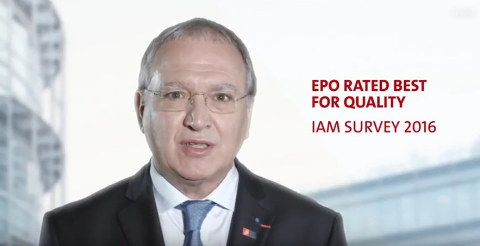The Liar in Chief keeps lying about quality while it sinks to bottom low

Summary: Anything goes at the EPO, except dissent; any patent application seems to be grantable, provided one uses simple tricks and persists against overworked examiners who are pressured to increase so-called 'production'
I USED TO be proud to say that we have the best patent office, which denies software patents among many other things. But today's EPO is in shambles and it now grants patents on the same things which the USPTO no longer grants patents on. In simple terms, there has been a reversal of roles and right now the EPO looks like 'SIPO Europe'. It's not only sad but also scary to humble companies whose entire operation is now at risk of falling prey to patent trolls.
Yesterday, a high-profile magazine
published "Europe says University of California deserves broad patent for CRISPR" and for those who don't know what CRISPR is about, start
here. It's one of those areas where the EPO's patent scope has demonstrably gone bonkers. Even patents on life are now permitted (
not just plants). To quote:
The European Patent Office (EPO) announced on 23 March its “intention to grant a patent” to the University of California (UC) for its broad-based claims about the genome-editing tool popularly known as CRISPR. UC, on behalf of several parties, has been in a pitched battle with the Broad Institute of Cambridge, Massachusetts, over CRISPR patents, and the new decision marks a sharp departure from the position of the U.S. Patent and Trademark Office (USPTO).
[...]
It’s unclear whether EPO’s actions will have any immediate impact. Companies already pay fees to these warring parties or their affiliates to license CRISPR patents. Some agreements cover international use of CRISPR to make products, and if the UC CRISPR patent stands up to challenges in Europe, companies that banked on the Broad may have to enter more licensing agreements. Companies technically do not need a license until they have a product on the market—that could take a decade for CRISPR-made medicines—but as Cook-Deegan notes, “Licensing is usually smoother and easier while there is still a veil of uncertainty so everyone has a stake in cutting the deal and gets a bit of what they want, even though they don’t know if the license is actually needed in the end.”
Remember that even the USPTO rejects it. Not the EPO...
And the same goes for software patents after
Alice. In the US software patents have become rather toothless (more on that later today), but in the EPO they are actively advocated, as we
last noted days ago. They even do this
publicly. They have no shame about it, in spite of the
ban on software patents in Europe. It's like the EPO flagrantly ignores the law and spits on the EPC. Grant Philpott, for instance, promotes this whole "CII" nonsense, bypassing restrictions by semantics. Then there's this long rant from yesterday, courtesy of Rui Seabra. Have a look:
https://twitter.com/RuiSeabra/status/846345323073196032
https://twitter.com/RuiSeabra/status/846366877857316865
https://twitter.com/RuiSeabra/status/846365416578564096
https://twitter.com/RuiSeabra/status/846362715174178817
https://twitter.com/RuiSeabra/status/846359167111761922
https://twitter.com/RuiSeabra/status/846356163889434625
https://twitter.com/RuiSeabra/status/846350874083540995
https://twitter.com/RuiSeabra/status/846349229681524736
https://twitter.com/RuiSeabra/status/846348408361242626
https://twitter.com/RuiSeabra/status/846348057281204224
https://twitter.com/RuiSeabra/status/846347535245594624
https://twitter.com/RuiSeabra/status/846345923307454464
https://twitter.com/RuiSeabra/status/846326332158066688
https://twitter.com/RuiSeabra/status/846323500390535168
https://twitter.com/RuiSeabra/status/846318410132803585
https://twitter.com/RuiSeabra/status/846318018800029696
https://twitter.com/RuiSeabra/status/846317119897845760
https://twitter.com/RuiSeabra/status/846314710089814016
https://twitter.com/RuiSeabra/status/846313972819263488
https://twitter.com/RuiSeabra/status/846313205592936448
https://twitter.com/RuiSeabra/status/846310893784838144
https://twitter.com/RuiSeabra/status/846309753756270592
https://twitter.com/RuiSeabra/status/846308220679458816
https://twitter.com/RuiSeabra/status/846307704813572096
https://twitter.com/RuiSeabra/status/846307409157132289
https://twitter.com/RuiSeabra/status/846306495407046657
https://twitter.com/RuiSeabra/status/846306267199164417
https://twitter.com/RuiSeabra/status/846279644752023552
Maybe it's time for European software developers to write a little less code and write more about what goes on inside the EPO, clearly a pariah organisation. Not even the law can stop it from granting patents that are in defiance of the EPC.
⬆

